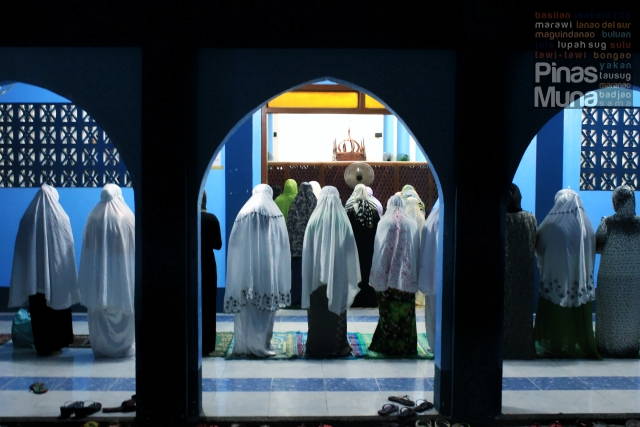
The sighting of the crescent of the new moon this evening ushers in the Blessed Month of Ramadan, one of the most special months for Muslims around the world. June 6, 2016 will be the start of the 29 to 30 days of Sawm, or fasting. During this period, our Muslim brothers and sisters will abstain from eating and drinking from dusk until dawn.
 |
| Satti is a traditional Tausug morning meal |
During Ramadan, Muslims would wake up very early in the morning at around 3:00am to eat Suhoor (also called Shuhur), the pre-dawn meal consumed before the Fajr (dawn) prayer. The Adhan (call) for the Fajr prayer marks the beginning of the day's fasting.
 |
| after the Fajr prayer in Jolo, Sulu |
After the Fajr prayer, food and drinks, even water, may no longer be consumed during daytime. This may be a challenging time for our Muslims, but the observance of fasting is what strengthens their self-discipline. Living in a multicultural society like the Philippines, non-Muslims among us should know the basic courtesy of how to interact with a Muslim relative, friend, neighbor, colleague or classmate during Ramadan.
 |
| Kumukunsi of Maguindanao |
At dawn, Muslims will break their fast with a light meal called Iftar. Traditionally, dates are eaten to break the fast. For may Muslim Filipinos, rice cakes or biscuits are the preferred Iftar. Socio-civic groups and local government units would host an Iftar for the community. We have experienced this during our visit to Cotabato City and Jolo during Ramadan. In the provinces, it is a common practice that families and friends would go the beach or seaports where they would break their fast right after the sunset.
 |
| Sunset at the Jolo Seaport |
Right after sunset, the Muslim call for prayer Adhan (also called Azan, or Bang in local dialects in the Philippines) will resonate from the mosques calling all Muslims for the Tarawih prayer.
 |
| Tarawih in Cotabato City |
After the Tarawih, dinner will be served at home where Muslims would eat with their families. Muslims living in cities away from their hometowns would dine together with their friends in Halal restaurants. Some Muslims would even invite their non-Muslim friends to dine with them. Local government executives would also host dinners in their houses welcoming religious leaders and community leaders.
 |
| Dinner community leaders in Jolo, Sulu |
In Cotabato City, an annual food fair is organized by the regional government inside the ARMM compound where families and friends can enjoy specialty dishes from various ARMM provinces. Cultural performances are also featured during the food fair. Find out more about the Ramadan Food Fair in Cotabato City.

Ramadan is also the time when mosques are being repainted and beautified making it one of the best times to visit Mosques around the Philippines. Always remember that mosques are places of worship and should be treated with respect. Men should wear shirts and pants, while women should wear long skirts. Taking photographs outside the mosque is generally allowed, but it is best to ask permission first from the mosque authorities, and they will usually allow you especially when you show them how much you appreciate the beauty of their mosque.

We wish all Muslims in the Philippines and around the world Ramadan Mubarak!

No comments:
Post a Comment